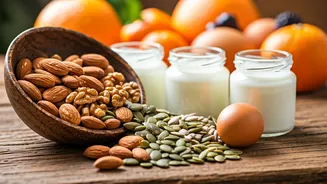Discover the power of antioxidants in disease prevention. Unravel their role in your health journey. Read on to enhance well-being
In today's fast-paced life, keeping healthy can feel like a full-time job.
We're bombarded with advice about exercise, diet, and supplements. Among all this information, the role of antioxidants often gets mentioned, but many folks aren't quite sure what they are or what they do.
Let's break down what antioxidants are, where to find them, and how they can help keep you healthy.
So, what exactly are antioxidants? Well, imagine your body is like a car. As it runs, it produces exhaust fumes. In your body, these "exhaust fumes" are called free radicals.
Free radicals are unstable molecules that can damage cells, proteins, and even DNA. This damage is called oxidative stress, and it's linked to various health problems like heart disease, diabetes, and even some types of cancer. Antioxidants are like the body's cleanup crew.
They neutralize these free radicals, preventing them from causing damage. They're like the peacekeepers of your cells, ensuring everything runs smoothly and preventing any cellular chaos.
Basically, they're your body's defense against the wear and tear of daily life, the unsung heroes working behind the scenes to keep you in top shape.
Now that we know what antioxidants do, where can we find them? The good news is that Mother Nature provides a bounty of antioxidant-rich foods.
Think of brightly colored fruits and vegetables – these are often packed with these beneficial compounds. Berries like strawberries, blueberries, and raspberries are excellent sources.
Other great options include leafy greens like spinach and kale, vegetables like carrots and sweet potatoes, and even beverages like green tea. The vibrant colors in these foods often indicate the presence of antioxidants.
For example, the deep red of tomatoes comes from lycopene, a powerful antioxidant. Similarly, the orange hue of carrots comes from beta-carotene, another potent antioxidant.
Adding a rainbow of fruits and vegetables to your daily diet is a simple and delicious way to boost your antioxidant intake and protect your health.
Antioxidants work by donating an electron to a free radical, thereby stabilizing it and preventing it from causing damage.
They essentially sacrifice themselves to protect other cells. There are different types of antioxidants, each with its unique properties and functions. Some common antioxidants include Vitamin C, Vitamin E, selenium, and beta-carotene.
Vitamin C, found in citrus fruits and other vegetables, is a water-soluble antioxidant that helps protect against infections and supports immune function. Vitamin E, found in nuts, seeds, and vegetable oils, is a fat-soluble antioxidant that helps protect cell membranes.
Selenium, found in Brazil nuts and other foods, is a mineral that helps protect against cell damage. Beta-carotene, found in orange and yellow fruits and vegetables, is converted into Vitamin A in the body.
Think of your body as a bustling city, where constant activity generates waste.
Antioxidants are like the sanitation workers, efficiently sweeping away the waste (free radicals) before they can cause damage and pollution. This cleanup process is crucial for maintaining a healthy environment within your body.
By neutralizing free radicals, antioxidants help prevent oxidative stress, a key factor in the development of numerous diseases. Oxidative stress occurs when there's an imbalance between free radical production and the body's ability to neutralize them.
This imbalance can lead to cellular damage and inflammation, which contribute to various health problems. Antioxidants help restore balance, protecting your cells and promoting overall well-being.
So, a regular intake of antioxidant-rich foods is akin to investing in a robust sanitation system for your body, ensuring a cleaner and healthier internal environment.
Now, you might be wondering if you can simply take antioxidant supplements instead of changing your diet.
While supplements can provide a concentrated dose of antioxidants, it's generally better to get them from whole foods. This is because whole foods offer a complex mix of antioxidants and other beneficial nutrients that work synergistically to promote health.
Relying solely on supplements can sometimes lead to an imbalance of nutrients and may not provide the same benefits as a diet rich in fruits, vegetables, and other whole foods. Studies have shown that high doses of certain antioxidant supplements can sometimes have adverse effects.
It's always best to consult with your doctor or a registered dietitian before taking any supplements, especially if you have any underlying health conditions.
A balanced diet, with plenty of colorful fruits and vegetables, remains the best way to ensure you're getting a sufficient and diverse range of antioxidants.
Making small changes to your daily routine can significantly increase your antioxidant intake.
Start by adding a handful of berries to your morning cereal or yogurt. Snack on carrots or bell peppers with hummus instead of processed snacks. Include a variety of colorful vegetables in your lunch and dinner. Drink green tea instead of sugary beverages.
These simple swaps can make a big difference in your overall health. Remember, it's not about making drastic changes overnight but rather about gradually incorporating more antioxidant-rich foods into your diet.
Every small step you take toward a healthier lifestyle will benefit your long-term well-being. So, start incorporating more antioxidants into your diet today and reap the rewards of a healthier, more vibrant you.
Here are some foods to add to your daily meal.















